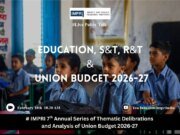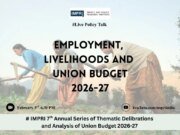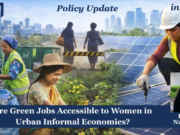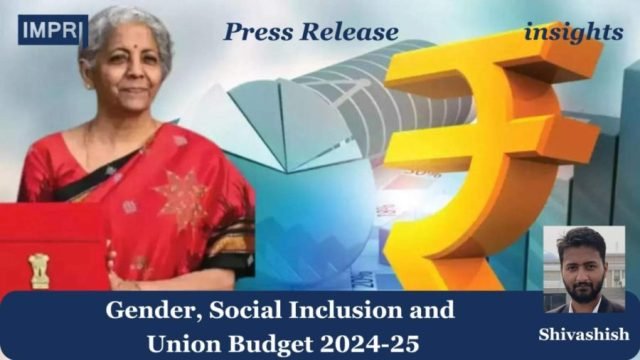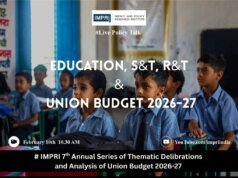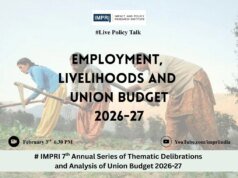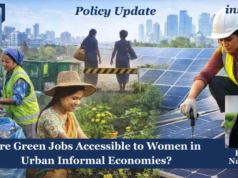Press Release
Shivashish
The IMPRI Gender Impact Studies Center (GISC), IMPRI, Impact and Policy Research Institute, New Delhi, hosted an interactive panel discussion on the topic “Gender, Social Inclusion and Union Budget 2024-25” on July 28, 2024, at 03:00 p.m. IST, under IMPRI 5th Annual Series of Thematic Deliberations and Analysis of Interim Union Budget 2024-25, as part of IMPRI.
The chair & moderator for the session is Prof Vibhuti Patel, Visiting Distinguished Professor, IMPRI; Former Professor, TISS, started with the key aspects of the Union Budget 2024-25, presented by the government which proposes ambitious plans to boost productivity and resilience in sectors like agriculture, employment, skilling, and inclusive human resource development with a focus on manufacturing, urban development, energy security and infrastructure.
Prof. Vibhuti Patel, speaking at a recent discussion, emphasized the budget’s implications for gender equity and social inclusion highlighting a three-lakh crore allocation for schemes benefiting women and girls. However, she expressed concerns over the budget’s binary approach to gender issues neglect of the transgender community’s needs underutilization of funds in key initiatives like the Nirbhaya Fund and Beti Bachao Beti Padhao and the lack of a clear roadmap for enhancing women’s work participation.
The effectiveness of urban poverty programs, such as the Pradhan Mantri Awas Yojana, was also questioned, along with the need for stronger interventions against hunger and malnutrition. Prof. Patel called for more intersectional, participatory, decentralized, and outcome-based gender-responsive budgeting to better address the needs of marginalized communities in India.
Prof Paramita Saha, Professor, Department of Economics, Tripura University, speaking at the IMPRI discussion, provided an overview of the Union Budget 2024-25, emphasizing its focus on social inclusion amidst various economic indicators. She noted that while the budget sets priorities in agriculture, employment, skilling, and infrastructure, it also presents challenges, such as inadequate attention to inequality and marginalized groups. She highlighted concerns over insufficient allocations for social sectors like health and education, and the limited impact of public spending on disadvantaged communities.
Prof. Saha also discussed the budget’s approach to employment and skilling, questioning the feasibility of achieving projected job growth. Additionally, she pointed out the need for more targeted interventions for the Northeast region, including promoting natural farming, tourism, and traditional crafts.
Prof N. Manimekalai, Director, Centre for Women Development Studies, New Delhi; Visiting Professor, IMPRI, focused on budget allocation and its impact on social exclusion and inclusion in India. Key issues highlighted include widening inequality since the neoliberal policies with increased informal labour, lack of social security, and insufficient support for marginalized communities like the poor, women, Dalits, and Adivasis.
The talk also emphasized the underfunding of essential sectors like education and health, noting that despite a push for digitalization and corporate involvement, these initiatives often fail to reach the most disadvantaged. Additionally, concerns were raised about the social sector’s inadequate investment in labour rights and working conditions and the need for more significant support for food security and social safety. The session underscored the necessity for increased budget allocations to genuinely address these critical issues.
Dr Aditi Kapoor, Co-founder and Trustee, Alternative Futures, New Delhi, emphasizes the importance of climate resilience, particularly to health and labour, with a focus on the informal sector. She critiques the current budget for its inadequate attention to pollution control, noting that it disproportionately affects marginalized groups like construction workers, street vendors, and slum dwellers.
Dr Kapoor highlights the lack of investment in climate resilience measures, such as flood and drought mitigation, and the insufficient support for women in disaster preparedness and response. She also points out the missed opportunities in promoting sustainable practices, like natural farming and renewable energy, and stresses the need for targeted support for women, particularly in initiatives like rooftop solar investments and electric vehicle ownership.
Additionally, she addresses the gaps in climate finance, the potential of the Green India Mission, and the challenges faced by women in agriculture, particularly in adopting new farming technologies and benefiting from government schemes like the Kisan Card, Drone schemes and SHGs. Dr Kapoor concludes with recommendations for enhancing the effectiveness of these programs and ensuring they are inclusive and empowering for all, especially women.
Dr Aditi Sawant, Associate Professor & Head, Department of Economics, St. Xavier’s College, Mumbai, critiques the Indian government’s budget allocation for the agricultural sector highlighting its inadequacy despite agriculture’s significant contribution to GDP and employment. She discusses three main areas: the low participation and empowerment of women in agriculture, the lack of social inclusion and technology penetration and insufficient investment in research and development.
Dr Sawant points out the disparity in land ownership rights for women and the need for better data on women agricultural workers. She emphasizes the importance of digital tools and market information for farmers which are currently lacking. Additionally, she calls for more comprehensive and sustainable policies rather than the disconnected initiatives seen in the current budget, suggesting the establishment of farmer schools for vocational training as a long-term solution to strengthen the agriculture sector.
Shri Shailesh Mishra, Founder President, Silver Innings Grou, criticizes the lack of focus on senior citizens in the Indian budget for 2024-25. He highlights that despite India’s ageing population, there has been negligible budget allocation for elder care, with only 2% of the Department of Social Justice and Empowerment’s budget dedicated to ageing issues.
Shri Mishra emphasizes the urgent need for structured policies to address health care, social engagement, and financial security for seniors. He criticizes the removal of railway concessions for the elderly and the imposition of GST on essential goods for seniors. Mishra calls for a comprehensive national elder care policy, improved infrastructure, and increased funding for existing programs. He also expresses frustration over the government’s neglect of senior citizen issues despite their significant voting power and contributions to society.
Dr Neha Shah, Associate Professor, L. J. University, Ahmedabad, discusses the current economic framework and its implications for social concerns in her presentation. She highlights the disparity between overall GDP growth and personal consumption expenditure, noting that while the economy is growing at 8.2%, personal consumption is only growing at 4%. This discrepancy, coupled with high-income inequality, underscores the need for more effective budgetary allocations to address social issues.
Dr Shah criticizes the minimal increase in budget allocations for social sectors like health, education, and social welfare, arguing that real-term funding is decreasing due to inflation. She emphasizes the importance of a progressive fiscal policy that supports underprivileged populations and expresses concern over the declining support for critical schemes and social sector funding, despite some positive steps in gender budgeting and support for women’s labour force participation.
Ms Deepa Pawar, Managing Trustee & Founder Director, Anubhuti Trust, Thane, critiqued the recent budget, emphasizing its inadequate support for marginalized communities, particularly the Nomadic and Denotified Tribes (DNTs). She pointed out the disproportionately low allocation of ₹5 crore for the Development and Welfare Board of these communities, despite their significant population.
Ms Pawar questioned the government’s political will and priorities, suggesting that the budget favours corporate interests over genuine social justice. She expressed concern about the insufficient funding for skill development and internships, arguing that these initiatives primarily benefit companies rather than addressing the real needs of marginalized groups. Additionally, she highlighted the inadequate provisions for scholarships for SC/ST students, indicating a broader neglect of these communities in policy planning. Overall, she argued that the budget fails to address the structural inequalities and needs of India’s most vulnerable populations.
The discussion featured a panel of distinguished experts who provided diverse insights into the budget’s implications. The budget was analyzed as both a financial and political document, with a call for stronger public intervention in employment, healthcare, and education. The challenges faced by informal sector workers were highlighted, emphasizing the need for long-term employment solutions and improved public distribution systems. There was advocacy for grassroots mobilization and a demand-driven approach to governance, critiquing superficial policy measures.
The importance of vocational and entrepreneurial training in education was underscored, along with criticism of the budget for its lack of depth in addressing core issues. The panel also pointed out the growing income inequality and stressed the importance of targeted government spending on health, education, and skills development. There was a passionate call for the establishment of a National Commission or Ministry for senior citizens to protect their rights and dignity. The discussion concluded with a call for sustainable development and a human rights perspective in economic policies, urging for more comprehensive and inclusive governance.
IMPRI’s 5th Annual Series of Thematic Deliberations and Analysis of Union Budget 2024-25
IMPRI’s 5th Annual Series of Thematic Deliberations and Analysis of Union Budget 2024-25
Watch the event at IMPRI #Web Policy Talk
Gender, Social Inclusion and Union Budget 2024-25
Acknowledgement- This article was written by Shivashish, Research Intern IMPRI


